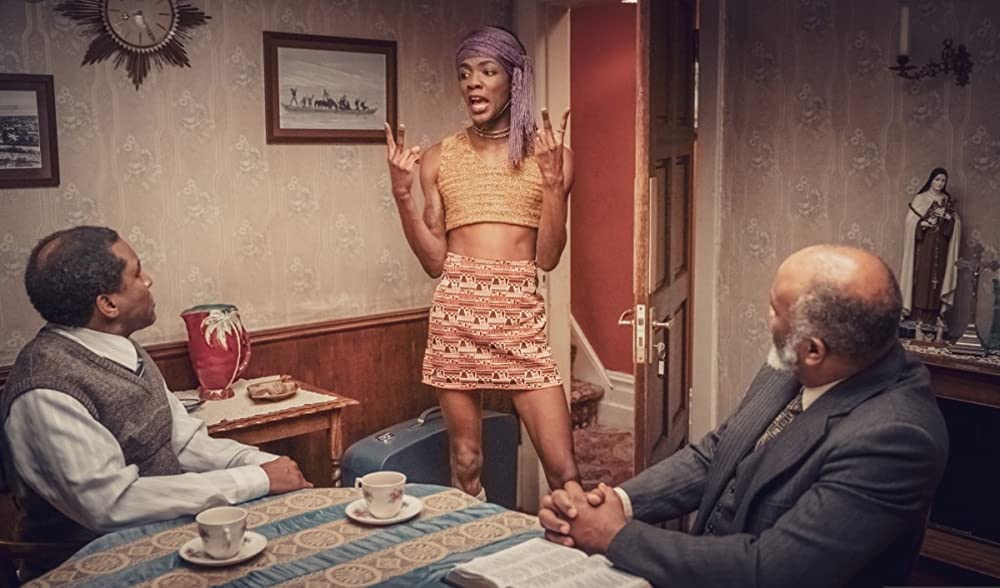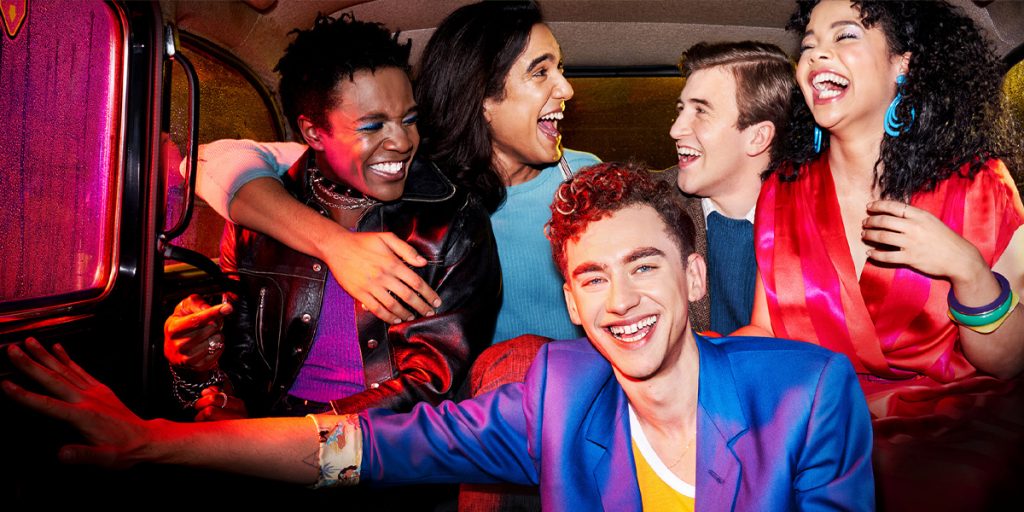Russell T. Davies’ phenomenal series It’s A Sin tells the story of the AIDS crisis in 1980s London through a group of friends who loved through it.
It’s London in 1981 and a group of friends have come together in a flatshare. Ritchie (Olly Alexander), escaping the mundanity of his stifling family home on the Isle of White to pursue his dream of being an actor; Roscoe (Omari Douglas), fleeing from an overbearing father who plans to send him to Nigeria as punishment for his ‘deviant’ sexual activities, and Colin (Callum Scott Howells), a gentle soul from rural Wales undertaking an apprenticeship in a Saville Row tailors. Alongside their female bestie Jill (Lydia West) and Ritchie’s on/off love interest Ash (Nathaniel Curtis), they are experiencing the joys of living as young gay men for the first time and the freedom that comes from finally being their authentic selves. But there’s a shadow lingering on the edges of their happiness, a mysterious disease from America that seems to be specifically targeting gay men. Over the course of a decade, It’s A Sin follows the evolvement of the AIDS epidemic and the impact it has on their lives and the culture of LGBTQ Britain.
Firstly, the cast are remarkable. The sheer vibrancy of their excitement and love for one another crackles on screen from the first episode, maturing as the series progresses and ages into a bone-deep comfort with each other. Despite a somewhat perfunctory introduction, and no particular exploration of one personality over another, the group are completely believable as friends and human beings who were thriving and existing in 1980s Britain, releasing a collective breath at being able to live so freely.
Alexander, in particular, is magnetic as Ritchie. His growing confidence within himself shines so brightly and the conflict in him, as he is forced to shift from an AIDS denier into someone forced to confront the harsh realities of this disease, is evident from every subtle movement of his face. West is also spectacular: the stable point of comfort and care whose worry and desperate need to do something to protect her friends echoes the sentiments of the audience. And they’re surrounded by a cracking supporting ensemble: Keeley Hawes as Ritchie’s mum, Neil Patrick Harris as a mentor-figure for Colin and Stephen Fry as a delightfully hissable, hypocritical Tory MP. It says a lot about the stature of Russell T. Davies as a writer that his stories are fleshed out with such impressive, authentic performances from such talented actors.

Because, for the unaware, Davies is somewhat of a pop culture phenomenon. From his revolutionary Queer as Folk in 1999, the revival of sci-fi classic Doctor Who in 2005, and the bold and audacious Years and Years in 2019, his work has shaped British television. The depth he brings to the stories he chooses to tell is incredibly well-executed, well-paced and well-plotted. His depictions of contemporary culture and sexuality have meant shows like Queer as Folk, Cucumber (2015) and its companion show Banana (2015) have entered the pantheon of realistic and authentic LGBTQ representational media. It’s A Sin will definitely join them. The show is unapologetic and frank in its depiction of life as a gay man in the 1980s, as well as of the progression of AIDS within the UK. It doesn’t spoon feed information to its audience, instead trusts them to follow each jump in time and piece together what the characters learn in the interim. It depicts sex in a naturalistic way in that it’s sometimes awkward, funny, intense, meaningless, significant, good and bad. It’s real.
There is a significant shifting point in episode 3, taking place in 1986, when the lingering threat of AIDS shifts from the periphery to the centre of their curated unit. The juxtaposition from the vibrant feeling of connectedness on the dancefloors in nightclubs, to the cold, sterile, terrifying isolation of the hospital wards is purposefully jarring, despite the creeping threat present in episodes one and two. Everyone fumbles through prejudices, disinformation and downright homophobic legislation to deal with this disease as it’s suddenly something they need to face immediately and directly. It’s something that is now affecting them.
While It’s A Sin is, essentially, a show about a devastating, fatal epidemic, it’s not just a show about death. While there have been many American stories about AIDS – Angels in America, RENT and Dallas Buyers Club to name a few – a British perspective is somewhat ground breaking. It’s a story Davies has been desperate to write, to tell, for decades as it comes from his own experiences; from lives he saw being lived and cruelly taken around him during the 1980s as a young man himself. His has long been an important voice in British television culture, particularly within LGBTQ stories and the manner in which they are told, but there’s an authenticity here, a heart and soul that comes from his personal connection to people like Ritchie and Colin and Jill. And his writing is so prolific and brilliant, that the seemingly impossible tonal shifts are seamless. The tension of an emotional moment is broken by a line of dialogue so darkly comedic that the tears fall through laughter. A single tiny phrase can summarise a character’s personality so perfectly that scenes of exposition are rendered obsolete. “Thank god for Maggie”, “I’m going to live”, “We have this great big killer disease and it’s happening in silence”. Davies imbues so much life into the show that the blows are as devastating and the highs are as euphoric as if you had lived them yourself.
And the relevance and timeliness of the manner in which Davies depicts the unfolding pandemic is remarkable, if completely coincidental. The rumblings of a mysterious flu-like disease across the ocean. Deniers and conspiracy theorists, spreading misinformation about contraction, spread, causes and treatments. Confusion, paranoia and fear among the public, as well as scorn, judgement and a sense of ‘it doesn’t affect my immediate community so I needn’t care’. Devoted but overwhelmed healthcare professionals doing their upmost. Young people begging for their voices to be heard, to be taken seriously. Obsessive cleaning and the slow understanding of precautionary measures. Ringing any bells? The show didn’t set out to make any particular statements regarding COVID-19, considering it was a pre-pandemic production and a story thirty years in the making, but the similarities are undeniable.
It simply adds to the frustration, to the fury at watching people claw and beg to be helped by an unsympathetic general public, government and civil systems. It puts into perspective how scary the 1980s were, considering a lack of access to credible information, an inherent shame in contracting it and the abuse of power undertaken by pharmaceutical companies in denying adequate treatment for all. It emphasises how traumatic a time this was people, for those who watched friend after friend, family member after family member, contract and waste away from a disease whilst unfairly maligned and ignored. The stories in It’s A Sin would have resonated with viewers had this been released several years ago, but the unintentional parallels stress just how much we have and haven’t learned in the intervening years.
Davies and director Peter Hoar have created a truly remarkable, ground-breaking and game-changing piece of television. As a representation of the AIDS epidemic in the UK and as a representation of the realities of gay men at that time. The overall emotional arc is so powerful that the splintering of it over a period of 10 years doesn’t ever feel episodic, instead like one linear piece of storytelling. It doesn’t ever victim-blame, but voices the impact that shame, prejudice and unsympathetic families had on the way those who contracted HIV and AIDS felt. It doesn’t over dramatise death, people go swiftly and quietly and suddenly; nor does it over-emphasise the symptoms, with none of the actors forced to undergo dramatic weight-loss or heavy prosthetics. It’s a culturally significant piece of simultaneously gut-wrenching and life-affirming television that is as much an education on that period of LGBTQ history as it is a piece a drama. It is both glorious and sad, funny and heart-breaking and full of joie de vivre and loss. It is such an important watch and cannot be recommended enough.
La!
It’s a Sin is now available to watch on Max.

